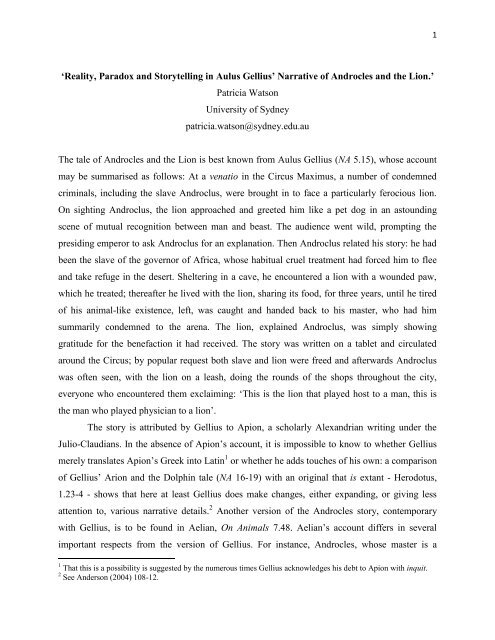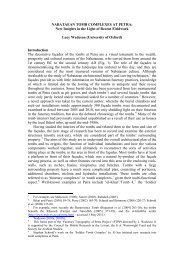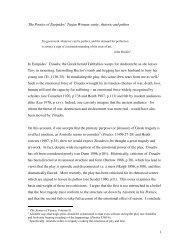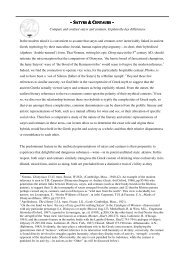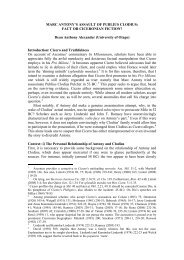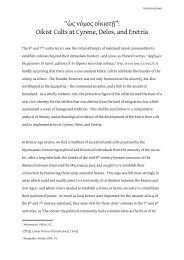'Reality, Paradox and Storytelling in Aulus Gellius' Narrative of ...
'Reality, Paradox and Storytelling in Aulus Gellius' Narrative of ...
'Reality, Paradox and Storytelling in Aulus Gellius' Narrative of ...
You also want an ePaper? Increase the reach of your titles
YUMPU automatically turns print PDFs into web optimized ePapers that Google loves.
1<br />
‘Reality, <strong>Paradox</strong> <strong>and</strong> <strong>Storytell<strong>in</strong>g</strong> <strong>in</strong> <strong>Aulus</strong> Gellius’ <strong>Narrative</strong> <strong>of</strong> Androcles <strong>and</strong> the Lion.’<br />
Patricia Watson<br />
University <strong>of</strong> Sydney<br />
patricia.watson@sydney.edu.au<br />
The tale <strong>of</strong> Androcles <strong>and</strong> the Lion is best known from <strong>Aulus</strong> Gellius (NA 5.15), whose account<br />
may be summarised as follows: At a venatio <strong>in</strong> the Circus Maximus, a number <strong>of</strong> condemned<br />
crim<strong>in</strong>als, <strong>in</strong>clud<strong>in</strong>g the slave Androclus, were brought <strong>in</strong> to face a particularly ferocious lion.<br />
On sight<strong>in</strong>g Androclus, the lion approached <strong>and</strong> greeted him like a pet dog <strong>in</strong> an astound<strong>in</strong>g<br />
scene <strong>of</strong> mutual recognition between man <strong>and</strong> beast. The audience went wild, prompt<strong>in</strong>g the<br />
presid<strong>in</strong>g emperor to ask Androclus for an explanation. Then Androclus related his story: he had<br />
been the slave <strong>of</strong> the governor <strong>of</strong> Africa, whose habitual cruel treatment had forced him to flee<br />
<strong>and</strong> take refuge <strong>in</strong> the desert. Shelter<strong>in</strong>g <strong>in</strong> a cave, he encountered a lion with a wounded paw,<br />
which he treated; thereafter he lived with the lion, shar<strong>in</strong>g its food, for three years, until he tired<br />
<strong>of</strong> his animal-like existence, left, was caught <strong>and</strong> h<strong>and</strong>ed back to his master, who had him<br />
summarily condemned to the arena. The lion, expla<strong>in</strong>ed Androclus, was simply show<strong>in</strong>g<br />
gratitude for the benefaction it had received. The story was written on a tablet <strong>and</strong> circulated<br />
around the Circus; by popular request both slave <strong>and</strong> lion were freed <strong>and</strong> afterwards Androclus<br />
was <strong>of</strong>ten seen, with the lion on a leash, do<strong>in</strong>g the rounds <strong>of</strong> the shops throughout the city,<br />
everyone who encountered them exclaim<strong>in</strong>g: ‘This is the lion that played host to a man, this is<br />
the man who played physician to a lion’.<br />
The story is attributed by Gellius to Apion, a scholarly Alex<strong>and</strong>rian writ<strong>in</strong>g under the<br />
Julio-Claudians. In the absence <strong>of</strong> Apion’s account, it is impossible to know to whether Gellius<br />
merely translates Apion’s Greek <strong>in</strong>to Lat<strong>in</strong> 1 or whether he adds touches <strong>of</strong> his own: a comparison<br />
<strong>of</strong> Gellius’ Arion <strong>and</strong> the Dolph<strong>in</strong> tale (NA 16-19) with an orig<strong>in</strong>al that is extant - Herodotus,<br />
1.23-4 - shows that here at least Gellius does make changes, either exp<strong>and</strong><strong>in</strong>g, or giv<strong>in</strong>g less<br />
attention to, various narrative details. 2 Another version <strong>of</strong> the Androcles story, contemporary<br />
with Gellius, is to be found <strong>in</strong> Aelian, On Animals 7.48. Aelian’s account differs <strong>in</strong> several<br />
important respects from the version <strong>of</strong> Gellius. For <strong>in</strong>stance, Androcles, whose master is a<br />
1 That this is a possibility is suggested by the numerous times Gellius acknowledges his debt to Apion with <strong>in</strong>quit.<br />
2 See Anderson (2004) 108-12.
2<br />
senator, has run away to escape punishment for a crime he has committed; when the lion spares<br />
him the crowd’s <strong>in</strong>itial reaction is that he must be a magician <strong>and</strong> a leopard is sent aga<strong>in</strong>st him<br />
which the lion kills: it is then that the story is revealed <strong>and</strong> Androcles <strong>and</strong> the lion set free; the<br />
events are narrated <strong>in</strong> chronological sequence, lead<strong>in</strong>g to the moral that animals possess memory.<br />
The precise relationship between Aelian, Gellius <strong>and</strong> Apion is unclear. Both Aelian <strong>and</strong><br />
Gellius might possibly go back <strong>in</strong>dependently to Apion, chang<strong>in</strong>g details <strong>of</strong> the story to suit their<br />
own purposes. For example, Scobie 3 suggested that the reason given <strong>in</strong> Gellius for Androcles’<br />
flight - escape from a cruel master - was derived from Apion, who would not, as a Greek, have<br />
been reluctant to record such behaviour on the part <strong>of</strong> a Roman senator; Aelian, on the other<br />
h<strong>and</strong>, as a member <strong>of</strong> the literary circle <strong>of</strong> Julia Domna, might have made alterations to Apion’s<br />
version to suit the sensibilities <strong>of</strong> his group, turn<strong>in</strong>g Androcles <strong>in</strong>to a crim<strong>in</strong>al fugitive from<br />
justice for an unspecified crime aga<strong>in</strong>st his master.<br />
Gellius’ narrative has been discussed from three perspectives: (1) as a folktale (Scobie<br />
1997) (2) for the light it casts on the attitudes <strong>of</strong> spectators to venationes (Fagan 2011) (3) as an<br />
illustration <strong>of</strong> Gellius’ storytell<strong>in</strong>g technique (Anderson 2004). I will discuss the story under each<br />
<strong>of</strong> these head<strong>in</strong>gs <strong>in</strong> turn.<br />
(1) Androcles <strong>and</strong> the Lion as Folk-tale<br />
Accord<strong>in</strong>g to Scobie 4 the story is pure fiction, a folk-tale <strong>of</strong> Aarne-Thompson’s type 156<br />
(animals who show gratitude for human benefactions). Scobie’s arguments <strong>in</strong>clude: (i) Pl<strong>in</strong>y’s<br />
(avowedly factual) list <strong>of</strong> animals that remember k<strong>in</strong>dnesses done to them by humans (HN 8.56-<br />
61) does not <strong>in</strong>clude this story, though he must have known it, especially s<strong>in</strong>ce it is mentioned by<br />
Seneca (Ben. 2.19.1): leonem <strong>in</strong> amphitheatro spectavimus, qui unum e bestiariis agnitum, cum<br />
quondam eius fuisset magister, protexit ab impetu bestiarum (‘We have seen a lion <strong>in</strong> the<br />
amphitheatre, who, when it recognized one <strong>of</strong> the men who fought with wild beasts as the man<br />
who had once been its keeper, protected him aga<strong>in</strong>st the attacks <strong>of</strong> the other animals’). Pl<strong>in</strong>y<br />
must therefore have recognised it as fiction. But the Senecan passage does not prove that Pl<strong>in</strong>y<br />
knew the story <strong>of</strong> Androcles, although the lion’s protection <strong>of</strong> its former tra<strong>in</strong>er from other<br />
animals might be reflected <strong>in</strong> the detail <strong>in</strong> Aelian’s account where the leopard sent aga<strong>in</strong>st<br />
3 Scobie (1977) 20.<br />
4 Scobie (1977) 18-23.
3<br />
Androcles is killed by the lion. (ii) there are fantastic elements <strong>in</strong> the account, such as the<br />
improbability <strong>of</strong> a lion be<strong>in</strong>g changed from savage predator to tame can<strong>in</strong>e-like pet, or the<br />
unlikely scenario <strong>of</strong> a lion be<strong>in</strong>g released <strong>in</strong>to the ownership <strong>of</strong> a former slave who was then<br />
allowed to parade it around the city on a lead. (iii) the suspicious appearance <strong>of</strong> the number<br />
three (Androcles stays with the lion three years; he is then captured after three days) is<br />
suggestive <strong>of</strong> folk-tales, <strong>in</strong> which the number is a significant one.<br />
It cannot be denied that Gellius’ narrative conta<strong>in</strong>s folk-tale elements or unrealistic<br />
details, such as a man <strong>and</strong> wild animal shar<strong>in</strong>g their liv<strong>in</strong>g quarters. But it does not necessarily<br />
follow that the story is ‘pure fiction’. Apion apparently stressed the fact that he witnessed the<br />
event with his own eyes:<br />
hoc autem, quod <strong>in</strong> libro Aegyptiacorum qu<strong>in</strong>to scripsit, neque audisse neque legisse, sed<br />
ipsum sese <strong>in</strong> urbe Roma vidisse oculis suis confirmat … ‘Eius rei, Romae cum forte<br />
essem, spectator’ <strong>in</strong>quit ‘fui’ (Gellius, NA 5.15)<br />
but this <strong>in</strong>cident, which he describes <strong>in</strong> the fifth book <strong>of</strong> his Wonders <strong>of</strong> Egypt, he declares that<br />
he neither heard nor read, but saw himself with his own eyes <strong>in</strong> the city <strong>of</strong> Rome … “Of that<br />
spectacle, s<strong>in</strong>ce I chanced to be <strong>in</strong> Rome, I was,” he says, “an eye-witness”.<br />
This affirmation may easily be <strong>in</strong>terpreted as a ploy to make the story realistic, but the emphasis<br />
on autopsy, together with the very specific Roman sett<strong>in</strong>g <strong>in</strong> a work otherwise deal<strong>in</strong>g with<br />
Egyptian marvels, might suggest that there is at least some basis <strong>in</strong> fact. Indeed, a major<br />
stumbl<strong>in</strong>g-block to acceptance <strong>of</strong> the story as real - that a ferocious lion would not behave <strong>in</strong> a<br />
manner sharply at odds with its wild nature - can be shown to be <strong>of</strong> dubious validity. In addition<br />
to ancient accounts such as those <strong>of</strong> Statius (Silv. 2.5) <strong>and</strong> Martial (1.6, 14, 22, 48, 51, 60, 104)<br />
<strong>of</strong> tame lions <strong>in</strong> the arena, 5 <strong>and</strong> the various tales <strong>of</strong> <strong>in</strong>terraction between wild animals <strong>and</strong><br />
humans recorded by Pl<strong>in</strong>y (loc. cit.; cf. Aelian, loc. cit.), two contemporary examples may be<br />
adduced. (i) Alex Larenty, an English animal expert work<strong>in</strong>g at a lion park outside<br />
Johannesburg, has forged a unique relationship with a n<strong>in</strong>e-year-old lion, Jamu, by rubb<strong>in</strong>g his<br />
5 See also Coleman on Mart. Spect. 12.
4<br />
paws. Larenty told the Daily Mail ‘he likes be<strong>in</strong>g scratched <strong>and</strong> tickled <strong>and</strong> now his favourite<br />
game is “This Little Piggy” ’. 6 (ii) Even more strik<strong>in</strong>g, <strong>and</strong> illustrative as well <strong>of</strong> a lion’s<br />
capacity for remember<strong>in</strong>g a former human friend, is the story <strong>of</strong> Christian the Lion, which has<br />
recently become widely dissem<strong>in</strong>ated via YouTube. Christian was purchased as a cub by two<br />
Australians, John Rendall <strong>and</strong> Anthony Bourke, <strong>in</strong> Harrods, London, <strong>in</strong> 1969. The store was<br />
desperate to get rid <strong>of</strong> the lion because <strong>of</strong> an unfortunate <strong>in</strong>cident when he escaped one night <strong>and</strong><br />
destroyed the carpet department. The men kept him till he was a year old, obta<strong>in</strong><strong>in</strong>g permission<br />
from a local vicar to exercise Christian <strong>in</strong> a church graveyard, <strong>and</strong> they also took their pet on day<br />
trips to the seaside. When keep<strong>in</strong>g a fully grown lion was no longer practical, they sent him to<br />
Africa to the care <strong>of</strong> George Adamson (who had raised Elsa the lioness, featured <strong>in</strong> the film Born<br />
Free). Christian was <strong>in</strong>troduced to the wild <strong>and</strong> became leader <strong>of</strong> a pride. Two years later, the<br />
two orig<strong>in</strong>al owners travelled to Kenya where their reunion with Christian was filmed. 7 The<br />
manner <strong>in</strong> which the lion pauses, then shows recognition, approaches slowly at first, <strong>and</strong> f<strong>in</strong>ally<br />
leaps up, tail wagg<strong>in</strong>g, <strong>and</strong> hugs <strong>and</strong> licks his former friends is markedly similar to Gellius’<br />
description <strong>of</strong> the recognition scene:<br />
hunc ille leo ubi vidit procul, repente ... quasi admirans stetit ac de<strong>in</strong>de sensim atque<br />
placide tamquam noscitabundus ad hom<strong>in</strong>em accedit. Tum caudam more atque ritu<br />
adulantium canum clementer et bl<strong>and</strong>e movet hom<strong>in</strong>isque se corpori adiungit cruraque eius<br />
et manus prope iam exanimati metu l<strong>in</strong>gua leniter demulcet.<br />
When that lion saw him from a distance, suddenly … he stopped short as if <strong>in</strong> amazement, <strong>and</strong><br />
then approached the man slowly <strong>and</strong> quietly, as if he recognized him. Then, wagg<strong>in</strong>g his tail <strong>in</strong> a<br />
gentle <strong>and</strong> caress<strong>in</strong>g way, after the manner <strong>and</strong> fashion <strong>of</strong> fawn<strong>in</strong>g dogs, he embraced the man,<br />
who was now half dead from fright, <strong>and</strong> gently licked his legs <strong>and</strong> h<strong>and</strong>s.<br />
In both modern examples, the tam<strong>in</strong>g <strong>of</strong> the lion is explicable: Christian the lion had been<br />
brought up from a cub, while Alex Larenty is an animal h<strong>and</strong>ler. In Gellius’ account, on the other<br />
h<strong>and</strong>, there is the much more improbable situation - that a human encounters a fully-grown lion<br />
6 http://news.n<strong>in</strong>emsn.com.au/glanceview/126971/tender-touch-tames-k<strong>in</strong>g-<strong>of</strong>-jungle.glance<br />
7 See www.youtube.com/watchv=cvCjyWp3rEk
5<br />
<strong>in</strong> the wild with whom he forges a relationship. Seneca’s brief allusion (cited above) to an<br />
occasion when a lion <strong>in</strong> the amphitheatre protected a beast-fighter from the onslaught <strong>of</strong> the<br />
other animals because the bestiarius had been the lion’s tra<strong>in</strong>er is a more plausible scenario, <strong>and</strong><br />
one which might conceivably underlie the Androcles story 8 , the tale be<strong>in</strong>g amplified <strong>and</strong><br />
embroidered, possibly under the <strong>in</strong>fluence <strong>of</strong> folktales. 9<br />
(2) Androcles <strong>in</strong> the Context <strong>of</strong> Venationes<br />
In a recent work on the social psychology <strong>of</strong> the arena, Garrett Fagan uses the Androcles story to<br />
cast light on audience atttitudes to venationes. 10 Although he regards the story as fable, he sees<br />
the reactions <strong>of</strong> the audience <strong>in</strong> Gellius <strong>and</strong> Aelian - astonishment <strong>in</strong> the first <strong>and</strong> v<strong>in</strong>dictiveness<br />
<strong>in</strong> the second case - as two alternative, but equally plausible, ways <strong>of</strong> behaviour on the part <strong>of</strong> a<br />
Roman audience whose expectations were confounded, that is, when a wild animal acted with<br />
friendl<strong>in</strong>ess rather than aggression towards its human prey. Certa<strong>in</strong>ly, the unprecedented<br />
behaviour <strong>of</strong> the lion underlies the audience’s response, accustomed as they were to lions<br />
rout<strong>in</strong>ely kill<strong>in</strong>g condemned crim<strong>in</strong>als <strong>and</strong>/or be<strong>in</strong>g killed themselves. 11 But more can be added.<br />
In Gellius’ account, <strong>in</strong> contrast to Aelian’s, both man <strong>and</strong> animal earn the sympathy <strong>of</strong> the<br />
spectators. For Androcles, as a condemned crim<strong>in</strong>al, the expected outcome <strong>of</strong> his fight as a<br />
bestiarius was death. Furthermore, if a condemnatus was spared, as sometimes happened, 12 it<br />
was because he had displayed some special sort <strong>of</strong> bravery or skill <strong>in</strong> fight<strong>in</strong>g - someth<strong>in</strong>g which<br />
Androcles had certa<strong>in</strong>ly not done. How, then, does Androcles earn his freedom What is<br />
important here is the <strong>in</strong>version <strong>of</strong> the usual roles <strong>of</strong> both slave <strong>and</strong> beast. Androcles, though a<br />
slave i.e. sub-human, 13 <strong>and</strong> a crim<strong>in</strong>al, redeems himself by display<strong>in</strong>g traits associated not with<br />
slaves but with humane, civilised Roman citizens: he performs a beneficium; 14 he not only pulls<br />
8 Especially if, as suggested above, the detail <strong>in</strong> Aelian <strong>of</strong> the leopard sent to attack Androcles reflects this story.<br />
9 Cf. Dunkle (2008) 228.<br />
10 Fagan (2011) 257-60.<br />
11 For the expectations <strong>of</strong> the audience <strong>and</strong> the popularity <strong>of</strong> spectacles <strong>in</strong>volv<strong>in</strong>g the death <strong>of</strong> crim<strong>in</strong>als, see<br />
Coleman (1990) esp. 54-57.<br />
12 Dunkle (2008) 139-40.<br />
13 For slaves as less than human <strong>and</strong> therefore regarded as legitimately subject to harsh punishments <strong>in</strong> the arena, see<br />
Coleman (1990) 55; Bradley (1994) 134-45 argues that despite the Stoic view (e.g. Seneca, Ep. 47) that slaves were<br />
part <strong>of</strong> a common humanity, the average Roman is likely to have regarded them as an <strong>in</strong>ferior species.<br />
14 It was disputed whether a slave could perform a beneficium: for the case <strong>in</strong> favour <strong>of</strong> this, see Seneca, Ben. 3.18-<br />
28, but his may be a m<strong>in</strong>ority view: cf. n.13 above.
6<br />
out the thorn, as <strong>in</strong> Aelian’s version, but he treats the wound <strong>in</strong> a way that displays a degree <strong>of</strong><br />
medical skill:<br />
Ibi … ego stirpem <strong>in</strong>gentem vestigio pedis eius haerentem revelli conceptamque saniem<br />
volnere <strong>in</strong>timo expressi accuratiusque s<strong>in</strong>e magna iam formid<strong>in</strong>e siccavi penitus atque<br />
detersi cruorem. Illa tunc mea opera et medella levatus …<br />
Then … I drew out a huge spl<strong>in</strong>ter that was embedded <strong>in</strong> the sole <strong>of</strong> the foot, squeezed out the<br />
pus that had formed <strong>in</strong> the <strong>in</strong>terior <strong>of</strong> the wound, <strong>and</strong> be<strong>in</strong>g now free from any great feel<strong>in</strong>g <strong>of</strong><br />
fear, dried it thoroughly <strong>and</strong> wiped away the blood. Then, relieved by that attention <strong>and</strong><br />
treatment <strong>of</strong> m<strong>in</strong>e …<br />
In addition, Androcles devises a way to cook his food <strong>in</strong> order to avoid eat<strong>in</strong>g it raw:<br />
nam, quas venabatur feras, membra opimiora ad specum mihi subgerebat, quae ego ignis<br />
copiam non habens meridiano sole torrens edebam (‘for he used to br<strong>in</strong>g for me to the cave the<br />
choicest parts <strong>of</strong> the game which he took <strong>in</strong> hunt<strong>in</strong>g, which I, hav<strong>in</strong>g no means <strong>of</strong> mak<strong>in</strong>g a fire,<br />
would roast <strong>in</strong> the noonday sun <strong>and</strong> eat’), that is, he st<strong>and</strong>s on the side <strong>of</strong> ‘culture’ versus<br />
‘nature’. Moreover, he eventually leaves because he tires <strong>of</strong> his animal-like existence (ubi me …<br />
vitae illius fer<strong>in</strong>ae iam pertaesum est, leone <strong>in</strong> venatum pr<strong>of</strong>ecto reliqui specum ‘after I had<br />
f<strong>in</strong>ally grown tired <strong>of</strong> that wild life, I left the cave when the lion had gone <strong>of</strong>f to hunt’), thus<br />
aga<strong>in</strong> assert<strong>in</strong>g his humanity; by contrast, Aelian’s Androcles amus<strong>in</strong>gly gets itchy because <strong>of</strong><br />
his unkempt condition. F<strong>in</strong>ally, Androcles can be seen to have tamed the lion by his act <strong>of</strong><br />
beneficium to it; thus represent<strong>in</strong>g the control <strong>of</strong> humanity - <strong>and</strong> Roman civilisation <strong>in</strong> particular<br />
- over the wild.<br />
As to the lion, its ferocity is stressed; it is not just any lion but an outst<strong>and</strong><strong>in</strong>g specimen:<br />
praeter alia omnia leonum . . . immanitas admirationi fuit praeterque omnis ceteros unus. Is<br />
unus leo corporis impetu et vastitud<strong>in</strong>e terrificoque fremitu et sonoro, toris comisque<br />
cervicum fluctuantibus animos oculosque omnium <strong>in</strong> sese converterat.
7<br />
But above everyth<strong>in</strong>g else … the ferocity <strong>of</strong> the lions was a cause <strong>of</strong> amazement, <strong>and</strong> above all<br />
other lions, one <strong>in</strong> particular. This one lion had drawn to itself the attention <strong>and</strong> eyes <strong>of</strong> all<br />
because <strong>of</strong> the vigour <strong>and</strong> huge size <strong>of</strong> its body, its terrify<strong>in</strong>g <strong>and</strong> deep roar, the development <strong>of</strong><br />
its muscles, <strong>and</strong> the mane stream<strong>in</strong>g over its shoulders.<br />
Such an animal would normally be expected to have ended its career by dy<strong>in</strong>g <strong>in</strong> the sight <strong>of</strong> the<br />
spectators, as does a lion <strong>in</strong> an epigram <strong>of</strong> Martial (Mart. 8.55). In Gellius’ story this supreme<br />
example <strong>of</strong> natural savagery is humanised <strong>and</strong> civilised: note that its cave is represented as its<br />
home: postquam <strong>in</strong>trogressus … leo … <strong>in</strong> habitaculum illud suum (‘But when the lion had<br />
entered his own little abode’). It stretches out its paw to Androcles <strong>and</strong> afterwards lies with its<br />
foot <strong>in</strong> his h<strong>and</strong>s; it is likened to a domesticated dog: caudam more atque ritu adulantium canum<br />
clementer et bl<strong>and</strong>e movet (‘he wagged his tail <strong>in</strong> a gentle <strong>and</strong> caress<strong>in</strong>g way, after the manner<br />
<strong>and</strong> fashion <strong>of</strong> fawn<strong>in</strong>g dogs’); Androcles leads it round the City loro tenui rev<strong>in</strong>ctum (‘attached<br />
to a slender leash’). Thus both Androcles - the crim<strong>in</strong>al <strong>and</strong> sub-human slave, <strong>and</strong> the beast, are<br />
elevated to the level <strong>of</strong> the civilised <strong>and</strong> tame, earn<strong>in</strong>g their liberation from the wild <strong>and</strong><br />
uncivilised doma<strong>in</strong> <strong>of</strong> the arena <strong>and</strong> their place <strong>in</strong> Roman society.<br />
(3) Gellius as Storyteller<br />
Anderson’s conclusion that Gellius is ‘not a gifted storyteller’ 15 may be challenged, especially by<br />
compar<strong>in</strong>g the version <strong>of</strong> Aelian. I have discussed above the ways <strong>in</strong> which Gellius, by stress<strong>in</strong>g<br />
the humanis<strong>in</strong>g <strong>of</strong> the slave <strong>and</strong> the lion, underscores the paradoxical nature <strong>of</strong> the tale. In<br />
particular, the extended descriptions, first <strong>of</strong> the exceptional ferocity <strong>of</strong> the lion, <strong>and</strong> then its<br />
can<strong>in</strong>e-like behaviour (cited above <strong>in</strong> section 1), serve to throw emphasis on the contrast between<br />
the lion’s natural wildness <strong>and</strong> its transformed state. The paradox is summed up <strong>in</strong> the<br />
conclud<strong>in</strong>g hic est leo hospes hom<strong>in</strong>is, hic est homo medicus leonis (‘this is the lion that played<br />
host to a man, this is the man who played physician to a lion’): contrast Aelian’s bald statement<br />
<strong>of</strong> the moral <strong>of</strong> the story- that animals possess memory.<br />
15 Anderson (2004) 117.
8<br />
It has also been shown how the stress on the tam<strong>in</strong>g <strong>of</strong> the wild <strong>of</strong>fers an explanation for<br />
the audience’s eager desire to see Androcles <strong>and</strong> the lion pardoned. This is brought out more<br />
clearly by the use <strong>of</strong> the ‘flash-back’ technique, which allows for the juxtaposition <strong>of</strong> Androcles’<br />
narrative <strong>and</strong> the audience’s reaction to it. Indeed, Gellius makes very effective use <strong>of</strong> this<br />
technique - <strong>and</strong> here a comparison with Aelian is aga<strong>in</strong> <strong>in</strong>structive. Whereas Aelian preserves the<br />
chronological sequence, Gellius engages the reader’s <strong>in</strong>terest immediately by commenc<strong>in</strong>g with<br />
a vivid description <strong>of</strong> the lions <strong>in</strong> the Circus, <strong>and</strong> the one <strong>in</strong> particular, as a lead-up to the<br />
encounter between Androcles <strong>and</strong> the lion. Furthermore, this narrative sequence is an effective<br />
means <strong>of</strong> add<strong>in</strong>g realism, Gellius start<strong>in</strong>g with a scene <strong>in</strong> the arena which might possibly have<br />
been familiar to his readers, 16 then <strong>in</strong>clud<strong>in</strong>g a story with<strong>in</strong> a story, as Androcles relates the part<br />
<strong>of</strong> the tale which conta<strong>in</strong>s the most fantastic elements but which, by be<strong>in</strong>g <strong>in</strong>corporated with<strong>in</strong> it,<br />
ga<strong>in</strong>s <strong>in</strong> credibility.<br />
F<strong>in</strong>ally, the circumstances under which Androcles has fled his master are notably<br />
different <strong>in</strong> the accounts <strong>of</strong> Aelian <strong>and</strong> Gellius. The former makes Androcles guilty <strong>of</strong> a crime<br />
aga<strong>in</strong>st his owner, which prompts his flight <strong>and</strong> leads to his eventual condemnation to the arena.<br />
By contrast, Gellius ev<strong>in</strong>ces sympathy for Androcles by lay<strong>in</strong>g stress on the cruelty <strong>of</strong> the slave’s<br />
master: it is this which both causes Androcles to flee <strong>and</strong> his master to have him subjected to a<br />
punishment that is somewhat excessive for the <strong>of</strong>fence (damnatio ad bestias, though<br />
occasionally <strong>in</strong>flicted on fugitives, was usually reserved for really serious crimes such as murder,<br />
sacrilege or arson 17 ). The reader is likewise encouraged to empathise with the lion, which is<br />
treated <strong>in</strong> an engag<strong>in</strong>g manner, especially <strong>in</strong> the f<strong>in</strong>al scene where it is seen mak<strong>in</strong>g the rounds <strong>of</strong><br />
the shops <strong>in</strong> Rome on a lead, like a pet dog.<br />
Gellius, then, highlights the paradoxical nature <strong>of</strong> the Androcles tale, so that the<br />
conclud<strong>in</strong>g hic est leo hospes hom<strong>in</strong>is, hic est homo medicus leonis is no mere rhetorical flourish<br />
but a summ<strong>in</strong>g up <strong>of</strong> the essence <strong>of</strong> the story. He arranges the narrative <strong>in</strong> such a way as to<br />
maximise its apparent reality <strong>and</strong> lastly, he encourages his reader, by evok<strong>in</strong>g sympathy for the<br />
slave <strong>and</strong> the lion, to identify with the audience <strong>in</strong> the arena, so that by the end the reader feels<br />
not only that a satisfactory conclusion has been reached but is also so <strong>in</strong>volved <strong>in</strong> the story that<br />
the question <strong>of</strong> its actual reality seems quite unimportant.<br />
16 Cf. discussion above <strong>and</strong> n. 6.<br />
17 Cf. Mart. Spect. 9.7-10 with Coleman, Garnsey (1970) 129-31.
9<br />
Works Cited<br />
Anderson, G. (2004). ‘<strong>Aulus</strong> Gellius as a Storyteller’, <strong>in</strong> L. Holford-Strevens <strong>and</strong> A.D. Vardi<br />
(eds.), The Worlds <strong>of</strong> <strong>Aulus</strong> Gellius. Oxford/ New York: Oxford University Press, 105-<br />
17.<br />
Bradley, K.R. (1994). Slavery <strong>and</strong> Society at Rome. Cambridge: Cambridge University Press.<br />
Coleman, K. (1990). ‘Fatal Charades’, JRS 80: 44-73.<br />
Dunkle, R. (2008). Gladiators. Violence <strong>and</strong> Spectacle <strong>in</strong> Ancient Rome. Harlow:<br />
Pearson/Longman.<br />
Fagan, G.G. (2011). The Lure <strong>of</strong> the Arena. Cambridge: Cambridge University Press.<br />
Garnsey, P. (1970). Social Status <strong>and</strong> Legal Privilege <strong>in</strong> the Roman Empire. Oxford: Oxford<br />
University Press.<br />
Scobie, A. (1977). ‘Some Folk-tales <strong>in</strong> Graeco-Roman <strong>and</strong> Far Eastern Sources’, Philol. 121: 1-<br />
23.


